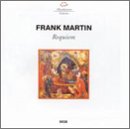| All Artists: Martin Bruns, Frank [1] Martin, Klaus Knall, Bernhard Billeter Title: Frank Martin: Requiem Members Wishing: 0 Total Copies: 0 Label: Musiques Suisses Release Date: 10/30/2001 Album Type: Import Genre: Classical Styles: Opera & Classical Vocal, Chamber Music, Historical Periods, Classical (c.1770-1830), Early Music Number of Discs: 1 SwapaCD Credits: 1 UPCs: 675754447625, 7617028759358 |
Search - Martin Bruns, Frank [1] Martin, Klaus Knall :: Frank Martin: Requiem
 | Martin Bruns, Frank [1] Martin, Klaus Knall Frank Martin: Requiem Genre: Classical
|
Larger Image |
CD Details |
CD ReviewsFine New Peformance of a Great 20th Century Requiem Nicholas A. Deutsch | New York, NY USA | 12/05/2001 (5 out of 5 stars) "Swiss composer Frank Martin (1890-1974) wrote some of the most profound & directly communicative religious music of the 20th century. His early Mass for Unaccompanied Double Chorus has become very popular, & there are also multiple recordings of In Terra Pax & Golgotha, the 2 great French-language oratorios of the 1940s. The Requiem (1971-72), the major work of his last years, isn't as well known, though it is every bit as inspired & accessible as the others. I hope this excellent new performance will introduce many new listeners to this beautiful, deeply moving piece.
From one angle, it stands directly in the line of the "big" settings of the Latin text by Berlioz, Verdi & Britten, among others: symphony orchestra, large chorus, 4 prominently used soloists. There's no lack of size or drama in the "Dies Irae," with its 5 percussionists plus timpani, or the joyous peal of sound that opens the final "Lux aeterna." But it's also a highly ritualized piece that places the words & meanings of the liturgical text front & center at all times. To pick out only a few of the memorable moments: the desolate sound of the oboe solo (here played on oboe d'amore) in the "Recordare," the mysterious exaltation of the "Sanctus," with its bells & ghostly harpsichord runs, the spiritual nakedness of the "Agnus Dei" (for alto solo & organ only), the consoling beauty of the "In Paradisum," & finally the A major blaze at the end - a "leap of faith" made real in music. For many years, the only available recording of the Requiem has been that of the composer-led world premiere in Lausanne, in 1973 (Jecklin-Disco JD 631-2) - a great occasion & a memorable performance, despite a few rough spots. But we have needed a new version, not least because Martin made some revisions in the "Sanctus" after the premiere. This recording is a worthy successor which moreover offers a subtly different view of the piece, focusing on its hieratic, timeless aspects, in contrast to the more urgent theatricality of the premiere. Both views are valid & illuminating. And there are really no weak links anywhere here in the conducting, singing or playing: everyone is working intently & successfully towards the same goal. The sound is also excellent, & we can hear clearly for the first time some important instrumental details, like the tom-tom & timpani rhythms at the start of the "Dies Irae" or the subtle string writing in the "In Paradisum." I strongly recommend this disc." |

 Track Listings (8) - Disc #1
Track Listings (8) - Disc #1